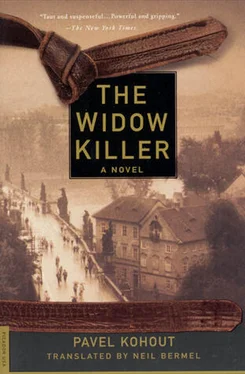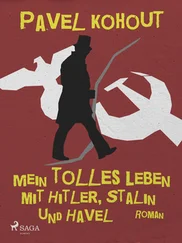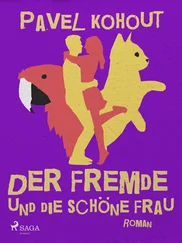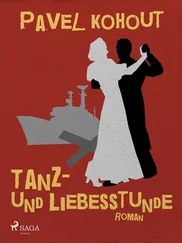Buback did not move.
“I have one further wish, Mr. Meckerle.”
He deliberately neither phrased it as a question nor used his superior’s title. It was a risk, to find out how far he could go with the lieutenant general.
“Speak.”
Nothing more. So he’d mellowed.
“Have you already sent your wife home?”
The question hit the mark. Meckerle’s answer was defensive.
“You know perfectly well I don’t have a ’home.’ They blasted my villa into smithereens.”
“But she’s left Prague.”
Meckerle was starting to seethe, just like he used to.
“Yes. She’s at her sister’s in Bavaria. Is this an interrogation, Buback?”
“I think it’s a man’s first responsibility to take care of those close to him. In your position, all the German civilians in Prague should fall into that category.”
There was still no outburst. Instead, the newly minted lieutenant general poured both of them another glass. But he did not drink; he was working up to a question.
“She’s still here?”
“Yes.”
“Where?”
“Last time you found out and practically had her abducted.”
Once again he watched this powerful man practically drown in childish embarrassment.
“Well, all right. It’s in the past. We all have our weak points; don’t you? Anyway, she set matters straight right away. I should really lodge a complaint through you about excessive self-defense…. Keep your hiding place to yourself, but watch out for her; it’d be a shame to lose her.”
“I can do that as long as the Czechs don’t completely control the city. Then she and all the other Germans left will be at their mercy. There are recognized principles for dealing with soldiers that have to be upheld, even, more or less, in uprisings. But for civilians there’s only a general declaration, and so far hatred has swept it aside each and every time. Yesterday, at a meeting in Pankrác, I suggested that we concentrate all civilian personnel under our protection; they’d certainly rather hang about the barracks on a hard floor than wait in their comfortable apartments until someone breaks down the door with an ax. Kroloff convinced the other officers that every German residence in Prague should become a fortress.”
“Kroloff s a fanatic and a moron.”
“Kroloff claimed to be quoting you.”
“Now wait!” Meckerle was on the brink of exploding, but immediately regained control. “Until yesterday I had orders from the highest levels of the Reich to boost soldiers’ and workers’ morale at any price. But I depended on each of you using your own brain.”
I’ve got to ride this one out in silence, Buback thought. The statement’s author soon realized how absurd it sounded.
“Well, yes, all right….” He sighed again. “We dug the spurs in; now we’ll have to ride the horse till it throws us. You can convey your idea about the prisoners to the Czechs as my own offer. I’ll have our civilians watched, but I can’t promise much. Most of the city is no longer in our control, and to tell the truth I’m hoping none of our men get the bright idea to try to reconquer it; that would hurt us even more. Anyway, the Czechs have new allies. Vlasov’s Russian division has moved toward Prague in the naive hope that they’ll get a pardon from Stalin if they come to defend the Slavs against the Germans, even though it’s shutting the door once the horses have left the stable. But don’t tell the Czechs; it’ll just puff them up. Let me make myself clear: The Reich is over, and the Protectorate no longer exists. I have no idea what Schör-ner’s up to, and no inkling what’s keeping Frank busy, but I know what I want. I’ve still got a good few thousand men armed to the teeth here in the city center whom the Czechs would be glad to get rid of because, well, why take the chance? I’m offering a nice little capitulation, one that’ll be tolerable for both sides, in return for a retreat where we’ll take all the remaining Germans with us. Pass it on to your cops, see to it they give us the green light, and save yourself and her.”
He placed the glass firmly down, stalked off to his desk, and began to rummage through the drawers. Buback had the impression the hearing was at an end, and moved to leave.
“Wait!” Meckerle stopped him. “Does she have a way to defend herself when you’re not around?”
“What do you mean?”
“I mean, did you at least leave her with a gun?”
“No… I don’t think she’d know how—”
“What? You didn’t know she was crazy about guns? I think one of her lovers got her interested in pistols. She even knew how to take mine apart; just to be sure, I always unloaded it. Wait….”
Finally he found it. What he gave Buback was a small ladies’ revolver with a handle of inlaid pearl.
“This little jewel, which makes perfectly good holes, was going to be a present for her. If it doesn’t bother you, give it to her with my apology. She can shoot me with it later. That’s all.”
Buback could not think of anything better than to stick the thing in his pocket. From behind as he left he heard Meckerle say nostalgically, “Tell her I said hello… that pretty little bitch.”
He felt another of the stabs inside which love used to scare war away.
While the photographer made more and more enlargements, Morava sat writing notes. He was taking the first five hundred prints out to Litera’s car, wracking his brains over how to arrange transport around the shattered city without Buback’s help, when he spotted him. The chief inspector was walking toward him from a controlled crossing point, waving at him like a friend arriving for a social get-together. From up close he did not seem as relaxed; he urgently requested a meeting with Beran.
The latter, now ensconced in Rajner’s office, made time for him immediately and got hold of Brunát as well, whose turban had lost its snow-white color overnight. The injured man looked as if he’d been wandering the sewers, the former superintendent (now the other half of their commissionership) joked, and Brunát, to their surprise, confirmed it. He had been directing work on the sewage-main barricades, so they wouldn’t find themselves — as he put it — with visitors up their asses.
Buback described the mood at the Gestapo and then went through Meckerle’s suggestions in detail; at that they sent him into the antechamber. After what Beran had said the night before, Morava would have expected him to be pleased at the disintegration of the unified German command, but the serious faces of both men told him there was a problem: The end of the war, in Prague and all over Bohemia, was sliding out of control.
He was even more shocked at the political problem presented by Vlasov’s anticipated attack on his former allies. The outlaw Russian general was expected to turn on the Germans, a move that would greatly help the insurgents. According to Beran, an increasing faction within the council believed that any cooperation with Vlasov was tantamount to approving the Russian rebels’ original motive for fighting against their native country.
The commanders from the city’s southeastern edge were asking urgently for an explanation: Why couldn’t they accept Vlasov’s men as emergency protectors? They were exasperated to see the Germans’ death grip closing around them, and made it clear how little these breaking and re-forming political ice floes interested them.
However, both commanders thought the suggested German retreat from the area around the main train station — a dangerous reinforcement source if Schörner should attack Prague — should be accepted as a local decision not affecting the Allied principle of total and unconditional capitulation.
Beran and Brunát therefore decided to recommend that the Czech National Council accept a political resolution to the situation.
Читать дальше












